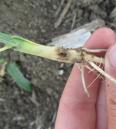“ScoutPro” Chosen as One of Four Finalists to Compete for Additional $25,000 in Prize Money at American Farm Bureau Federation (AFBF) Annual Convention in San Diego
Iowa Farm Bureau’s Renew Rural Iowa (RRIA) program, which has helped more than 2,500 Iowans successfully own and grow their businesses, has helped ‘ScoutPro,’ a pest and weed identification tool, advance to the ‘Top 4’ of the national Rural Entrepreneurship Initiative (REI) finals competition in San Diego, January 11th.
‘ScoutPro’ founders, Michael Koenig, Stuart McCulloh and Holden Nyhus won $15,000 for advancing to the ‘top 4’ national competition, and are now eligible to win $15,000 more in prize money, as well as a chance to vie for the $10,000 ‘People’s Choice Award.’
The ‘ScoutPro’ app puts the power of pest and weed identification on easily-accessible iPads or mobile devices, providing today’s farmers an effective tool to combat the threat of crop damage from pests. The app developers, who just graduated last year from Iowa State University, knew they had a great idea, but didn’t know how to turn that idea into a business. It all came together when a Farm Bureau RRIA presenter came to their entrepreneurship class. “The hands-on mentoring of IFBF’s Renew Rural Iowa program helped their dream get from the blackboard to investors’ boardrooms,” says Adam Koppes, IFBF investment manager. “We know there are more great ideas out there in Iowa, and making them a reality is what we do,” says Koppes. To learn more about the next RRIA seminar, “The Journey to Your Vision,” on January 13, 2015 in Newton, visit www.renewruraliowa.com.
The Farm Bureau Rural Entrepreneurship Challenge is a key component of the REI, a joint effort between AFBF and the Georgetown McDonough School of Business. The REI is directly tied to AFBF’s mission of building strong and prosperous agricultural communities. The challenge will provide the finalists with prize money totaling $85,000 to implement their ideas.

